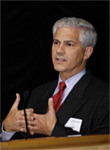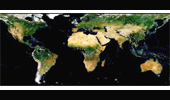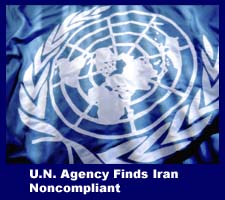|
|
China,
Russia and Iran
Stronger
diplomatic action on Iran depends
heavily on the policies of Russia and
China. According
to two senior associates at the Carnegie
Endowment, the actions that either country takes
next should be understood in light of
their
threat
perceptions, economic interests, and the strength
of the U.S.-French-German
coalition.
In
a candid April 18 interview, Director of
the
Russian & Eurasian Program
Andrew Kuchins
and
Director of the China Program Minxin Pei
gave
their perspectives on Russia and
China’s foreign
policy views of Iran.
(Read
More)
|
Iran's
Long Nuclear Road
How
long will it take for Iran to
produce a nuclear weapon?
On April 11, 2006, Iran
announced that it had enriched a small quantity of
uranium to 3.5 percent in its experimental
164-centrifuge test cascade. It also
announced plans to begin building a
3,000-centrifuge cascade by the end of
2006.
The best
estimates indicate that Iran is
5-10 years away from the ability to enrich enough
weapons-grade uranium for a nuclear weapon. But
there are major uncertainties with these
estimates. One worst-case scenario could have
Iran with a nuclear
bomb at the end of 2009, but that assumes that
Iran
does not encounter any of the technical problems
that typically plague such
programs.
As reported in August 2005 by the Washington
Post, the National Intelligence Estimate
on Iran concludes
that Iran is
closer to 10 years from having a nuclear bomb. The
IISS
(International Institute for Strategic Studies)
hypothesizes that it would “likely require a few
years to complete and operate a pilot-scale test
facility of several thousand centrifuges” and
“likely a few years to produce enough HEU for a
single nuclear weapon.” One of the most
comprehensive reports to date has been published
by David Albright and Corey Hinderstein at ISIS
(the Institute for Science and International
Security). The report speculates that it may
be possible for Iran to
build a nuclear weapon by
2009.
This analysis
explores this worst-case estimate. It concludes
that carefully tracking the Iranian progress over
the next two years and giving IAEA inspectors the
authority and ability to fully investigate all
facilities will be the key to determining when, or
if, Iran
could achieve the ability to produce the material
for a nuclear bomb. (Read
More)
|
The
End of Neoconservatism
If
Francis Fukuyama is right, the neoconservative
movement is dying. Good riddance. Through
their network within the Bush administration,
these intellectuals wreaked havoc on American
national security interests, ruined the
international reputation of the country and drove
up a staggering national debt. In his
February 19
New York Times magazine article, “After
Neoconservatism,” Fukuyama pronounces
the theory a failure, noting that all its major
tenets have been discredited, including
predictions about the need for and consequences of
invading Iraq. He should know. He was one of
the leading architects of the movement he now
dissects.
“The so-called Bush
doctrine,” he writes, “is now in shambles.
The doctrine…argued that, in the wake of the
Sept. 11 attacks, America would have
to launch periodic preventive wars to defend
itself against rouge states and terrorists with
weapons of mass destruction; that it would do this
alone, if necessary; and that it would work to
democratize the greater Middle East as a long-term
solution to the terrorist
problem.”
Fukuyama
argues that the Bush administration is now in a
full-scale retreat from these positions. Last
year, when he was writing the book that forms the
basis of his article, it may have seemed that
way. Then, as he points out, Secretary of
State Condoleezza Rice was tacking back to the
center with more pragmatic diplomatic efforts on
both North
Korea and Iran
that were bearing fruit.
But
Fukuyama missed
or underestimated the conflict within the
administration. Officials still fixed on
regime overthrow struck back, crippling the North
Korean diplomacy and confusing an already
complicated Iranian effort. As Jessica
Mathews points out in her recent New
York Times opinion
piece, the administration still
“cannot decide whether the top priority of its
Iran
policy should be regime change or
non-proliferation; as a result, others of the
major powers do not trust and will not fully
support its antinuclear efforts.” (Read
More)
|
 |
|
|
|

|
Interview on C-SPAN: April
12, 2006
Joseph Cirincione discussed
reactions to Iran's claims of uranium
enrichment. He stresses that there is no
military option. He offered recommendations on
how to work towards a diplomatic resolution over
the nuclear program.
Click here for a
video link of his interview.
Interview on KQED: April 12,
2006
Joseph Cirincione addressed issues posed
by the Bush Administration's plans to develop
new nuclear weapons. Col. Mike Turner
(USAF-Ret.), Congresswoman Ellen Tauscher ,
(D-California), Lawrence Korb, senior fellow at
the Center for American Progress, and Yale
University Professor Paul Bracken.
Click here to
listen to the forum.
Interview on NPR's "On Point":
April 11, 2006
Joseph Cirincione
joins Seymour Hersh of The New Yorker
and others in a discussion on Iran's
nuclear program. Cirincione highlights the
parallels between the Bush administration's
strategy on Iraq and their intentions of regime
change in Iran.
Click here for a
video link of his interview.
Interview on NPR's Talk of the
Nation: April 12, 2006
Joseph
Cirincione discusses the latest Iranian nuclear
claims of uranium enrichment and highlights the
best national intelligence and IAEA estimates on
the nuclear program. He also emphasizes the
danger of keeping an American military option on
Iran on the table.
Click here for
streaming audio.
Interview by Bernard Gwertzman, Council
on Foreign Relations: April 4,
2006
Joseph Cirincione expressed concern that
the some in the Bush administration are intent
on launching a military strike on Iran. He calls
on the Bush administration to declassify
intelligence estimate on Iran's nuclear
capabilities, which indicate that Iran is far
from having nuclear weapons. Click here for the
full transcript of the interview.
Interview on PBS NewsHour,
March 2, 2006
Joseph Cirincione
discussed the danger that U.S. civilian nuclear
cooperation with India poses for the
international nonproliferation framework. For a
transcript of this
segment is available online.
Click here to
access streaming video.
| | |
 |
|
|
|

|
Deadly Arsenals II:
The
second edition of Carnegie's proliferation
atlas, Deadly
Arsenals: Nuclear, Biological and Chemical
Threats, is now available for purchase.
The second edition is substantially revised and
updated with new chapters on Iran, Iraq, North
Korea, Libya and others. The original 2002 book
was selected as a CHOICE Outstanding Academic
Title in 2003 as a "best of the best in
published scholarship." The study is widely used
in university graduate and undergraduate courses
and is a staple on experts' bookshelves. For
additional information, please click
here. |
 |
Universal Translations:
The new Carnegie report has been
translated into Russian, Chinese, and Arabic, and will also be
distributed throughout India. The Carnegie
Endowment released "Universal
Compliance" in March 2005. This new
blueprint for the international nuclear
non-proliferation regime reflects input from
experts and officials in the United States and
twenty countries across Europe, Asia, the Middle
East, the former Soviet states and
Russia. | | | |
 |
|
|
IAEA Report by the Director General
on Iran
28 April 2006
|
"Controlling Iran’s Nuclear
Program"
Joseph Cirincione, Issues in
Science and Technology, Spring 2006
|
"The Iran Plans"
Seymour M.
Hersh, New Yorker, 8 April 2006
|
"Fool Me Twice"
Joseph
Cirincione, Foreign Policy, March 27, 2006
|
The National Security Strategy,
The White House, March 2006
|
Statement to the United Nations
Conference on Disarmament by HE Mr. Mottaki,
Minister of Foreign Affairs of the Islamic
Republic of Iran
31 March 2006
|
National Military Strategy to Combat
Weapons of Mass Destruction
Report by the
Department of Defense, 24 March 2006
|
The Clock is Ticking, But How
Fast?
David Albright and Corey Hinderstein,
Institute for Science and International Security,
27 March 2006
|
Preventing Catastrophic Nuclear
Terrorism
Charles D. Ferguson II, Fellow
for Science and Technology, Council on Foreign
Relations Special Report, March 2006
|
(Click here for more latest
resources)
| |
 |
 |
| Project
News |
 Why We Fight Why We Fight
A new
award-winning documentary by Eugene Jarecki
features extensive commentary by Carnegie's
Joseph Cirincione. The film is now playing
nationwide. Click here to
visit the film's
website.
|
|
 Carnegie has a
new DVD with "A Brief History of the Atomic
Age," and talks with the director general of the
IAEA and three of the world's top nuclear
historians. The events were filmed at the
Carnegie Non-Proliferation Conference.
Click
here to order your FREE
copy. Carnegie has a
new DVD with "A Brief History of the Atomic
Age," and talks with the director general of the
IAEA and three of the world's top nuclear
historians. The events were filmed at the
Carnegie Non-Proliferation Conference.
Click
here to order your FREE
copy.
|

2005 Carnegie
International Non-Proliferation
Conference, November 7-8 in
Washington, DC. Access the special conference
website for audio, video, prepared remarks,
rapporteur summaries, photo galleries and more.
For additional information, click here.
|
|
 Deadly Arsenals
II Deadly Arsenals
II
The new edition of Carnegie's
proliferation atlas, Deadly Arsenals: Nuclear,
Biological and Chemical Threats,
is now available. Click here to read sample
chapters.
|
|

Get
the Proliferation News
email. Top stories, latest
analysis, and the best resources sent to you
every Tuesday and Thursday. Free. Click
here to sign
up. |
|
 Iraq Intelligence
Page Iraq Intelligence
Page
Read reports, news
stories, expert analysis, and testimony on
intelligence on Iraq. Also, access Carnegie's
2004 Report, WMD in
Iraq, which provides the best
available summary of what was claimed, what the
intelligence supported, and what was actually
found on Iraq's weapons
program.
|
|

Deadly
Maps
The complete collection of
maps from Carnegie's Deadly
Arsenals.
|
|
 What's New? What's New?
Click
here to view recent updates to our site,
including the latest reports, up-to-date expert
analysis, and government resources.
|
 A.
Q. Khan A.
Q. Khan
Click
here for the best resources on the web on
the A.Q. Khan nuclear black market. |
 Administration
Resources Collection of testimony,
statements and reports from the Bush
Administration. Administration
Resources Collection of testimony,
statements and reports from the Bush
Administration. |
 Carnegie Director
for Non-Proliferation Joseph
Cirincione was singled out by the
National
Journal as one of
one hundred Americans whose ideas will influence
the key issues for this
administration. Carnegie Director
for Non-Proliferation Joseph
Cirincione was singled out by the
National
Journal as one of
one hundred Americans whose ideas will influence
the key issues for this
administration. |
 Ballistic
Missile Reader Ballistic
Missile Reader
Twenty
years of writings on missile and anti-missile
systems. |
|
 FOREIGN POLICY
MAGAZINE FOREIGN POLICY
MAGAZINE
Carnegie's
award-winning magazine provides unique coverage
of the most significant trends and events
shaping the world
today.
| | |
 |










 Iraq Intelligence
Page
Iraq Intelligence
Page What's New?
What's New?


 Carnegie Director
for Non-Proliferation
Carnegie Director
for Non-Proliferation 
